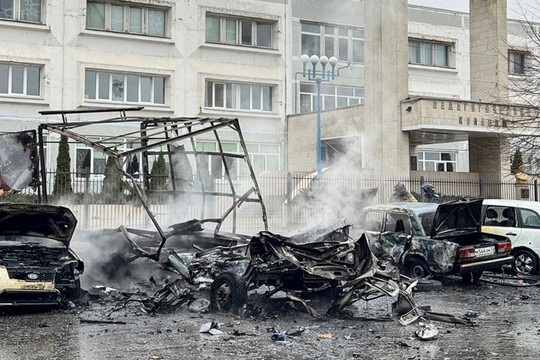Cars damaged by shelling from Ukraine in Belgorod, Russia, March 16, 2024.
Photo: AP/Belgorod-regionens guverner Vyatsjeslav Gladkovs Telegramkanal
In the wake of terror attack at the Crocus City Hall near Moscow, which has claimed at least 143 lives, the Ukrainian military has escalated its shelling of the Russian city of Belgorod. According to Belgorod local Governor Vyacheslav Gladkov, five civilians were injured after the region came under attack from over dozen rockets early Tuesday morning, write international observers Jason Melanovski and Clara Weiss.
Later in the day, the Russian Defense Ministry confirmed they had repelled an “attempt by the Kiev regime to carry out a terrorist attack” using Czech-supplied RM-70 Vampire multiple rocket launchers and claimed that 13 projectiles had been destroyed in mid-air.
The most recent attack was preceded by a series of rocket strikes in Belgorod during the Russian presidential elections that killed at least five civilians and forced the closure of schools and shopping malls. During the election itself, Russian neo-Nazi militias, backed by Ukraine and NATO, launched an incursion into Russian territory. It was the first attack on Russian territory involving tanks since the defeat of the Nazis by the Red Army in World War II.
As the war situation has continued to rapidly deteriorate for Ukraine at the front due to a severe manpower and ammunition shortage, it has conversely intensified its missile and artillery attacks on Belgorod. The city lies only 25 miles east of the Ukrainian border.
Just prior to New Year’s Eve, shelling from Ukrainian forces killed 25 people celebrating the holiday and injured more than 100. Another strike in mid-February killed seven people and injured 20. Last week, Russia announced the evacuation of 9,000 children from the region.
In retaliation, Moscow recently carried out a series of large-scale bombardments against Ukraine, damaging critical infrastructure, such as the Dnipro Hydroelectric Power Station, cutting electricity to tens of thousands of Ukrainians.
The US has remarkably quickly moved on from the Moscow terror attack. However, political developments and the findings of the investigation by Russian authorities point to precisely such involvement.
The four men arrested were all immigrants from a region in Tajikistan which borders Afghanistan. The Islamic State Khorasan Province (ISIS-K – banned in Russia) is known to have been particularly active in that region, and it is also known to have been effectively a creation of the United States. Meanwhile, the head of the Russian secret service FSB, Alexander Bortnikov, has claimed that Ukrainian Secret Service (SBU) had trained militants in the Middle East and pointed to the substantial number of Islamist militants fighting on the side on the Ukrainian Armed Forces.
Meanwhile, terrorist attacks on Russian soil and Russian-occupied parts of Ukraine are an all but official component of Ukraine’s war strategy. Zelensky’s presidential adviser Mykhailo Podolyak announced in an interview that “this is the stage of the war… when hostilities are gradually being transferred to the territory of the Russian Federation.” He threatened that Ukraine would ramp up strikes on Russian-occupied areas, as well as inside Russia itself, carried out by “agents” or “partisans.”
On March 26, four days after the Crocus City Hall attack, the head of Ukraine’s Secret Service SBU, Vasily Maliuk, responded to a question by a journalist about a series of assassinations and terror attacks on Russian authorities in the occupied territories. “The question is exactly on point. We will not officially recognize this in any way, but at the same time, I am ready to disclose the details to you.” His statement was reported by the Russian state outlet Izvestiia as a “de facto acknowledgement” of Kiev’s responsibility for Friday’s terror attack.
In yet another development that went virtually entirely unreported in the US media, the Turkish government has arrested at least 147 suspected militants of the IS in 30 cities across the country. Combined with another police raid on Sunday, Turkish authorities have arrested at least 211 people since the attack on the Crocus City Hall. Both Russian and Turkish media have reported that two of the alleged perpetrators of the attack had stayed in Turkey for several weeks between mid-February and early March.
read more in our Telegram-channel https://t.me/The_International_Affairs

 9:52 31.03.2024 •
9:52 31.03.2024 •























